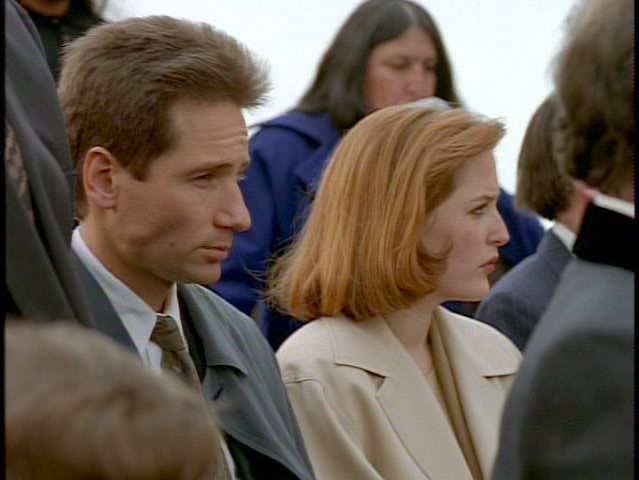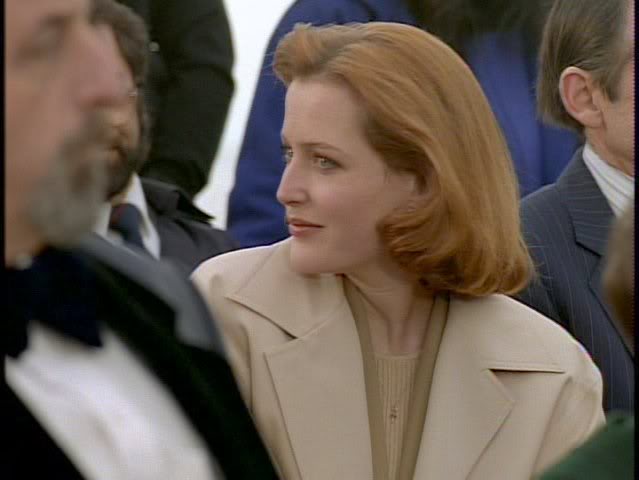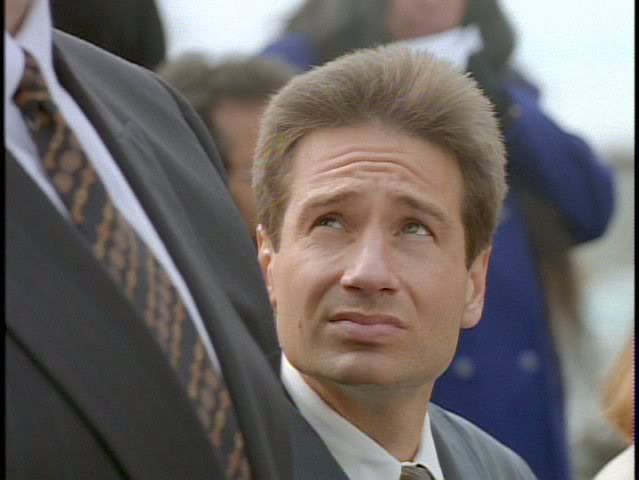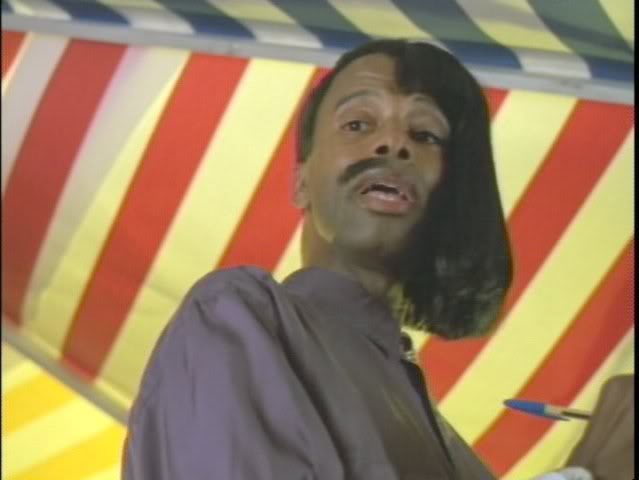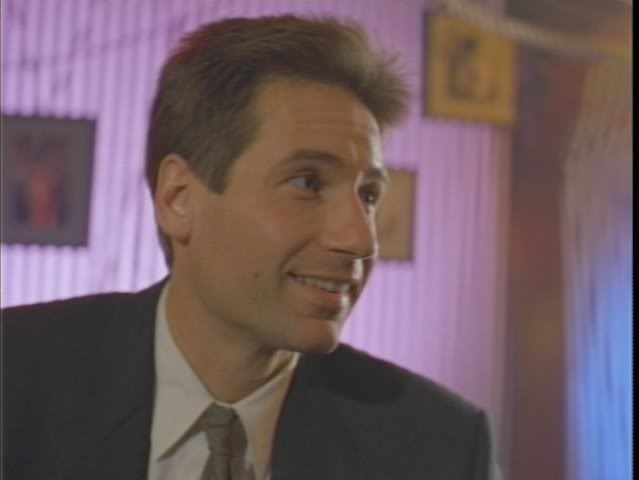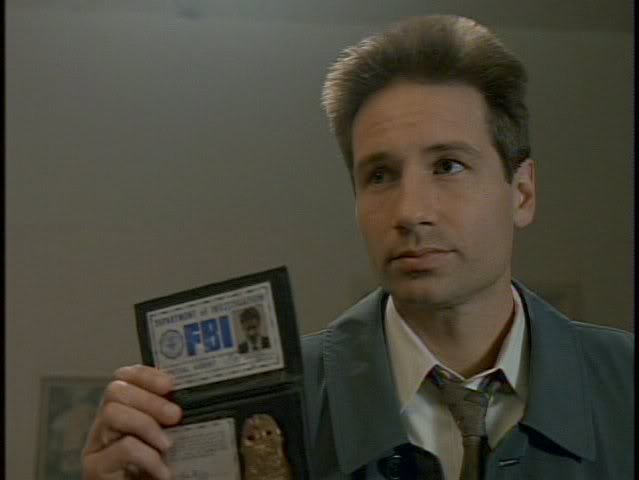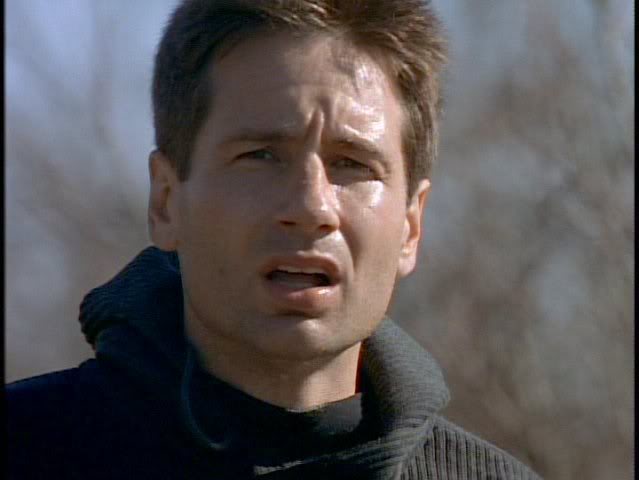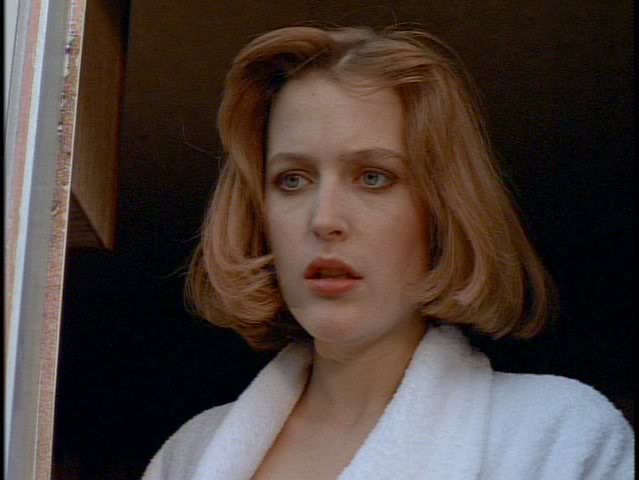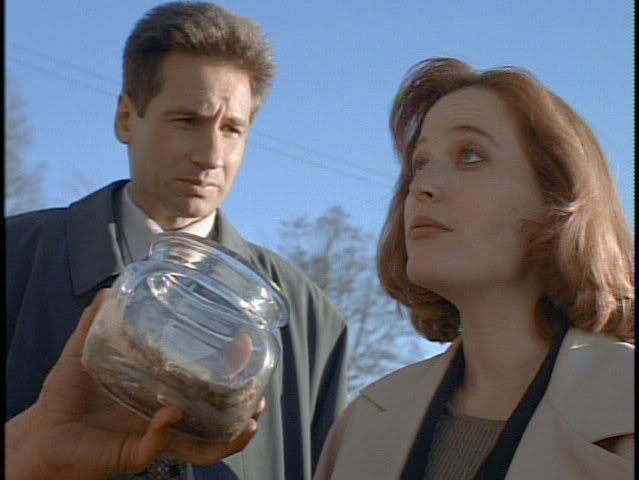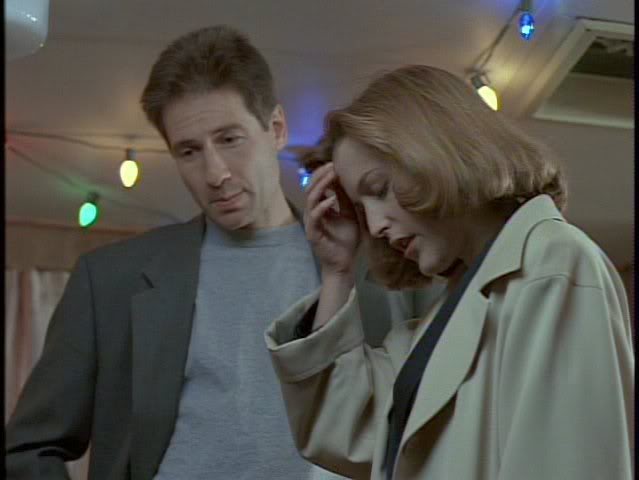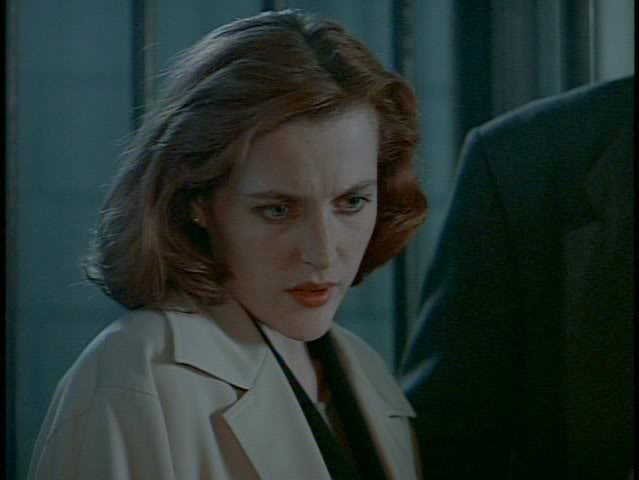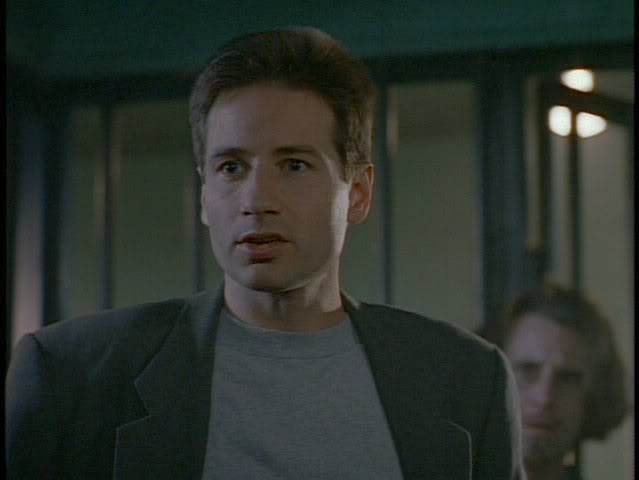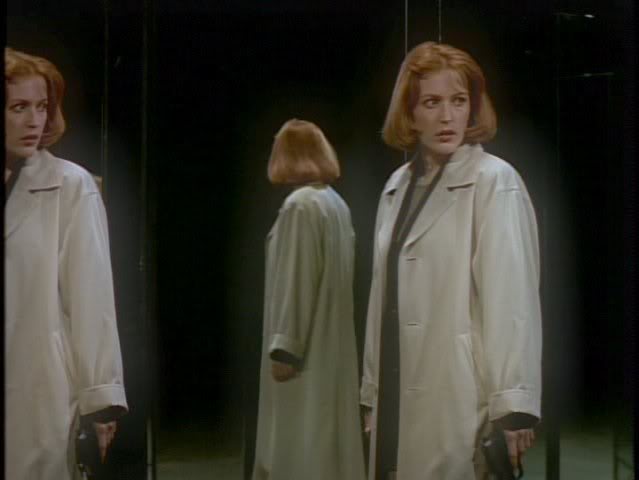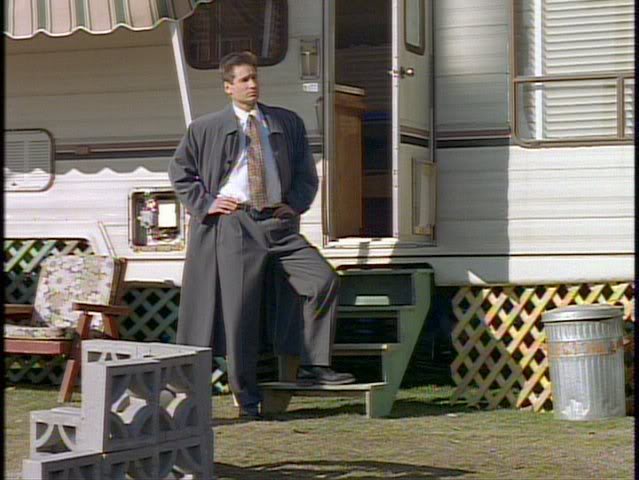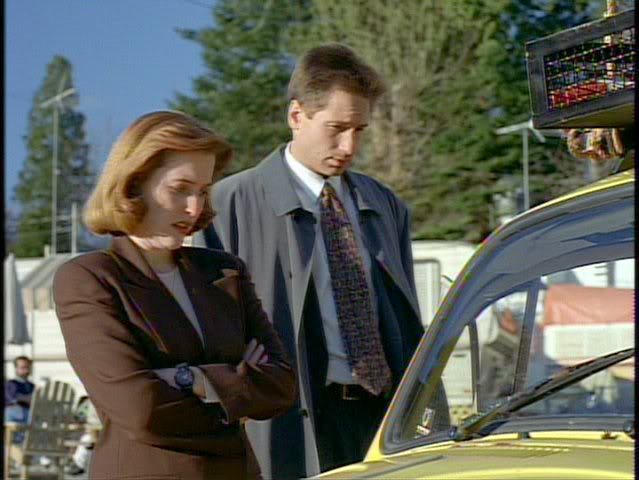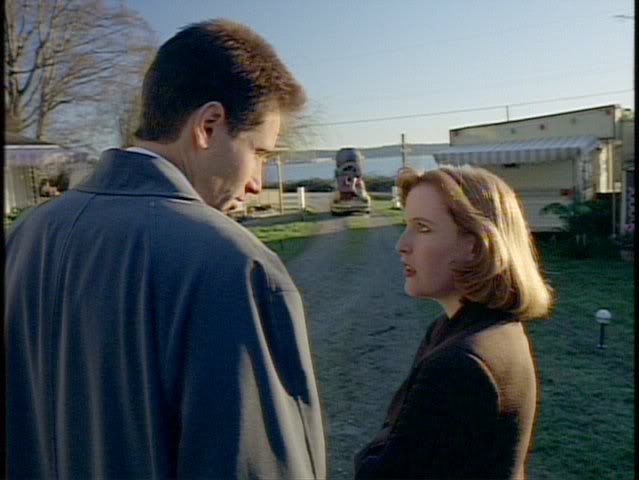CTP Episode of the Day - 12.11.06 - Humbug
Today's Cherished Episode: Humbug (2x20)
Original Air Date: March 31, 1995
Written By: Darin Morgan
Directed By: Kim MannersMulder and Scully investigate the bizarre death of a retired escape artist in a town populated by former circus and sideshow acts.
"Imagine going through your whole life looking like that."
Some "Humbug" Tidbits & Musings:
-- Darin J. Morgan was named after singer Bobby Darin, a favorite of his parents. He grew up in Syracuse, New York, until he was ten years old when his parents packed up the family and relocated to San Diego, California. Described as an "old soul" by his own mother, Darin was also a typical younger brother who always followed in the footsteps of what his big brother did. Said older sibling Glen, "Being the oldest, I played sports first. I wasn't bad ... but when Darin began playing, he was the greatest Little League baseball player ever. So when we moved to California, I became interested in drama class and doing plays. I thought, 'All right, Darin will be the athlete and I'll be the theatre guy.' When Darin got to high school, he did plays also and was the greatest actor in the history of high school productions."
-- Darin even followed Glen to the same film program at Loyola Marymount University. During his time there, he made waves with one of his student films, Legends of Doo-Wop (1988). This wacky six-minute mockumentary starred its director, Tony Mortillaro, and Darin as two men who claimed to have been "the hit factor" behind some of the biggest names in rock n' roll. The little student production won various accolades and awards, and apparently turned enough heads to garner Darin a three-picture deal with Tristar when he was only 19 years old. Darin never completed his studies at LMU, not because he had hit the big time, but because he decided that he couldn't bear the stigma of being a "film school graduate."
-- Thankfully, being the son of Wayne Morgan, an insurance salesman by trade, was really all the film school he needed. His father was (and continues to be) a huge film buff and took his sons to the movies constantly during their formative years. It was then that Darin fell in love with the works of the great comedians -- Buster Keaton, Charlie Chaplin, Harold Lloyd, and Preston Sturges -- and came to appreciate such filmmakers as Howard Hawks and Billy Wilder. "I saw Buster Keaton's The General for the first time in a theatre that had an organ," Morgan recollected, "and I don't want to sound melodramatic, but seeing The General changed my life. I thought, 'Wow, this is what I want to do!'"
-- Part of the deal Tristar had signed with Darin was on the strength of a comedy he wrote called Hellbound, which apparently was a story not unlike Bill and Ted's Bogus Journey in subject matter. His first task was to write a studio conceived picture called Bel Air Patrol which he described somewhat disdainfully as a "cross between Beverly Hills Cop and Police Academy." Darin wasn't too impressed with Hollywood's constant marginalization of his work, and he soon found himself unemployed with the scripts remaining unproduced.
-- During his long unemployment, Darin landed a couple acting credits on The Commish (as a corrupt pizza delivery boy) and 21 Jump Street (as a teenage street hustler) -- two shows which brother Glen and his partner James Wong were working on at the time. There is little else to share about his career before his arrival into the X-Files world, in which he played the infamous Flukeman in the classic episode, "The Host." Although Chris Carter joked in the past that suffocating Darin in a heinous rubber suit without a fly was a rite of passage for all of his prospective writers, it was actually Glen who asked his brother to help out with some ideas on an episode he and Jim Wong were working on, entitled "Blood." Together they conceived a story which revolved around a postal worker who begins to receive hallucinatory homicidal messages. In the end, the script was needed in such a hurry that Glen and Jim had to finish it up themselves.
-- Darin did, however attend a few story meetings. He left a good impression from these meetings on X-Files writer/producer Howard Gordon, who suggested to Chris Carter that he be invited to join the show's writing staff -- a job he was initially reluctant to accept. "I know Glen didn't want me on the show," he recalled, "I was a comedy writer, he knew that, and I'm somewhat unprofessional in my work habits." Darin was content just sitting at home reading lots of books.
-- Meanwhile, Darin's agent was banging his head against his desk and tearing out his hair. "[He] said, 'Look, they're offering you this job, you're nuts not to take it!' and I really couldn't argue with him. The joke I always tell is I would have turned down the job if it had been offered to me, but they just said, 'You're hired' and I said okay."
-- Unlike story editors for other series who often have to hit the ground running, Morgan was given a great deal of time to familiarize himself with The X-Files and its creative process. "When I started, they basically said, 'Sit in on all the story meetings, try to help everyone, and try to come up with a story.' I didn't have a specific deadline. They basically said, 'Hang out and see how things are done' so I was given an incredible amount of time to come up with the story of 'Humbug.' I don't know if everyone forgot about me, or they just assumed that Glen was supervising me and was aware of where I was in the story, but Glen was working on the pilot for Space: Above and Beyond so he had problems of his own. And also Glen knows that I like to be left alone, so he left me alone and no one knew what I was doing."
-- This foray into dark comedy grew out of a suggestion by Glen Morgan to his brother. "The word came down from Glen, 'Do one about circus freaks,'" recalled Morgan. "They had a board with various ideas, like UFO abductions, demon possession -- one of them was freaks. I guess Glen figured it suited my sensibilities to write about something bizarre like that instead of UFOs."
-- Darin immediately sat down to watch a tape of the Jim Rose Circus given to him by his brother. (The story idea about circus freaks had been on the X-Files storyboard since all of the show's writers and producers had seen the film about Rose's Circus that was used as an opening act at Lollapalooza.) Morgan also did "a ton of research" on the history of sideshows and circus freaks in general. Once embarked on the script, he found he couldn't help but write it with a humorous slant. "I wasn't trying to be goofy," Morgan said. "I wasn't told to do a funny X-File. I just wrote an episode that would have enough scares and be strange enough to be an X-File, and where the comedy would be good enough that they would let it slide. And that's what they did. They said, 'Okay, we're going to go with it.'"
-- "I discovered there really was a town in Florida that was a retirement community for sideshow people," Morgan said. [Gibsonton, Florida, where the episode is set, was famous as a sideshow wintering town where various circus freaks would spend the off-season. Aside from the agreeable winter climate, Gibsonton offered unique circus zoning laws that allowed residents to keep elephants and circus trailers on their front lawns.] "So I figured that was a great place to set a story. Before joining the staff, I had done a lot of research into serial killers, because I was going to do a movie about serial killers, so I was more familiar with that angle than say the normal X-Files stuff. I looked at this serial murder research and said, 'Well, there's a serial murderer, and he's a sideshow freak.' I then saw some pictures of parasitic twins, where the twin is hanging out of the person's body, and some of these guys claimed that their twins could move to a certain extent. I just took that one step further, actually one great step further, and that's how the story came about."
-- As Morgan remembered, the taboo subject on "Humbug" was not sideshows or freaks but the use of comedy to tell the story, though executive producer Chris Carter (ever fond of baseball analogies) was ready to take a gamble and "throw a knuckleball" at the audience. "I felt that by episode 44 we had earned the right to take a breather, and that people would appreciate a break from the unrelenting tension and paranoia," Carter explained. "And it wasn't so far afield for The X-Files, even though the tone was different. We were still dealing with rather creepy stuff."
-- The initial reluctance about the episode came from the network. "It would be very difficult to tell that story without some humor seeping through," said Morgan. "So I think Chris was aware of that to some extent. He liked the humor, but the network was terrified. They thought it would ruin the show. And I know Kim Manners was uncomfortable with it. Everyone was perplexed except for Chris and David and Gillian, who looked at it as a nice change of pace."
-- Carter agreed that the studio was "nervous" about "Humbug," but probably the most nervous person was director Kim Manners, who confessed to a panic attack when he realized he was about to undertake "the first comedy episode of The X-Files." While the episode was shooting, he had no idea whether it was going to work or not. "This was only the second episode I directed, and Chris Carter wanted to explore new ground. And I was the guy that was going to take the patient into the operating room and do an entirely unproved operation and see if it was going to still have a heartbeat when it left surgery. And it did. But I was really scared to death. I had been directing in television for 16 years at that point, and it was the first time since the first episode of television I ever directed that I had literally been frightened."
-- Manners' first directing assignment on The X-Files had come earlier in the year when Glen Morgan and James Wong, with whom he had worked on 21 Jump Street brought him in to direct their final script for the show, "Die Hand Die Verletzt." That episode had moments of exaggerated humor, played as straightforwardly as possibly, and Manners' approach towards "Humbug" was similar. "I felt that the script was funny, and if I played it straight and let the comedy bleed through, it would be genuinely, honestly funny. I tried to stay away from the obvious slapstick and to keep it from being too broad. It was a struggle. The idea was, we'd better not say, 'Hey, this is X-Files, the comedy.' What I wanted to do was, 'This is X-Files, and it's a funny episode, so enjoy it for that."
-- With Carter's approval, Morgan began laying the foundation for what would become the most offbeat X-Files episode of the first two seasons. "The starting point was the twin brothers, once I figured out that one of the twins was the killer. If you read about people who worked on a sideshow, most of them apparently didn't seem to mind their abnormalities, and yet there were some -- Chang and Eng, the original Siamese twins who were very famous and had a very happy life. They were both married and had big families, and yet one of them was an alcoholic. You try to imagine what it would be like to have a connected twin but you just can't."
-- Once Morgan had his killer in place, the writer had to create a number of possible suspects who may have been capable of committing the gruesome murders. "P.T. Barnum always had a number of midgets in his circus, and I guess the whole thing about freaks is how you treat them. You take one look at a person and think you can sum them up very quickly, so I wanted to have this midget in a town full of circus freaks, and you just assume this guy worked for the circus, but he didn't; he was the motel manager, Mr. Nutt. So that was the basis of that character. Once you had the twins, you had to have other suspects, and since we occasionally showed a small body moving around, people might have thought the midget was the killer. It was just another red herring."
-- "Instead of trying to come up with more suspects and red herrings, I wanted to come up with interesting characters, which to me was more interesting," recalled Morgan. "The Dr. Blockhead character was not really a credible suspect, but he was an interesting character, this weird guy who does weird things to his own body. He was based on Jim Rose's stage character, not really on Jim, who was actually quite different from the character you saw on stage. You assumed he was a crazy nut, but he was actually a crazy con man who really knows what he does."
-- "The Enigma was in Jim's show, and part of his stage act was eating live insects," Morgan said. "Circus geeks are the guys who eat live chickens and stuff. They're usually considered the lowest of the low on the sideshow circuit, but reading about it I thought, if the guy could eat a chicken, who's to say he couldn't eat something bigger, like the twin? You've got this guy who could eat things, who was a possible suspect, and I thought it was great to have him actually eat the killer. I was worried that they wouldn't let me go that route, but they did."
-- Jim Rose (Dr. Blockhead) and the Enigma (The Conundrum) -- neither of whom had acted before -- were cast in key roles in "Humbug." After they were cast, the extras casting folks "beat the bushes," as director Kim Manners put it, to find the other characters featured.
-- Chris Carter remembered The Enigma coming to The X-Files office to read for the role in "Humbug." "Here's a guy who ate anything and everything," Carter recalled, "And when someone asked him if he wanted something to eat, he said he would like a cookie."
-- Not surprisingly, one of Morgan's most important themes in "Humbug" was simply that one can't judge a book by its cover. "I guess that's best exemplified in the teaser, where you see this creature which you thought was a hideous monster about to kill two kids, but it was really a tender-hearted father playing with his two boys. You thought you were seeing one thing, but you were actually seeing the exact opposite. I tried to carry that through into almost every scene in the show. You thought the midget was a circus performer, but he wasn't; he was just a small manager. With almost every character, you basically thought they were one thing when they were really another."
-- Another scene that illustrated this theme took place in the museum of curiosities. Beautifully shot by Manners and director of photography John Bartley, the sequence allowed the viewer to glimpse the museum curatorís severely disfigured face and hand primarily through reflections from a number of mirrors, or from obscuring angles. Morgan wrote it that way for several reasons, one of which was practical in nature. "I didnít know how much time special effects makeup designer Toby Lindala would have. This was just one scene, and I didn't want to do too intricate a makeup job, so we did end up showing a little bit more of it than I originally thought we would." Morgan also didnít want to "gross people out, to be honest. I didnít want people to be afraid to look at it. But also, it had to do with people with physical deformities, the idea being that you want to look but donít want to look - looking by not looking."
-- This latter idea also inspired a scene where Gillian Anderson and Vincent Schiavelli, who played Lanny, a man with a "parasitic" or underdeveloped twin attached to his body, encounter each other early in the morning. Their bathrobes are slightly open, and they canít help but peek at each other. "People look at other peopleís body parts, without trying to look like theyíre looking," observed Morgan. "If any man was to see Scully in her bathrobe, and it was slightly ajar, he would glance, but trying to look like he was not glancing. And I believe itís the same way with peopleís deformities. You donít want to stare, and yet youíre attracted. And so I was playing off those inclinations."
-- Some of The X-Files online fans read more into Morganís gentle spoof than he intended. Although he wanted to "have fun with the viewersí expectations of the show," Morgan was not responding to any specific audience concerns. For example, in one scene, Mulder fell onto a bed of nails and pronounced it more comfortable than a futon. Fans thought that was a joke referring to a computer conference where Chris Carter had said Mulder slept on a futon. Morgan, whose first contact with online computer discussions was a huge sheaf of printouts about "Humbug" given to him by The X-Files staff, said the line "was just a reference to futons. I had no idea there was a question among the viewers as to what Mulder sleeps on!" Another example was the hotel managerís comments about Mulderís "unimaginative necktie design." Said Morgan, "I didn't know that Mulder normally wears flashy ties. I watch the show and I picked that up, and people commented, 'Oh, he's making a joke about the ties,' but I was not aware that Mulder's ties were a past topic of discussion." He added ruefully, 'I had no idea I was tapping into the collective unconscious.'
-- Although ďHumbugĒ was fraught with dialogue and situations of deadpan hilarity, the characters were always treated with dignity and respect, and when the story called for earnestness, levity was temporarily abandoned. The central scene for both Morgan and Manners was a completely serious one: Lannyís confession in the jail cell that his underdeveloped twin had the ability to detach himself and had inadvertently killed trying to find a new host to replace the dying, alcoholic Lanny. "I wanted to play that for real compassion and sympathy, and make it an honest, heartfelt moment," said Manners. "It made me feel good that, in the middle of this carnival of fun, we could give the audience a scene where there was a guy who was really dying of alcoholism. And we showed his pain about this twin brother that he had taken care of, and done everything for -- he had nothing in his life because of this brother. And that scene paid off. I felt really good about it."
-- Fortunately for an episode set in Florida, most of the shoot took place during weather unusually warm and sunny for winter in Vancouver. Even so, Mother Nature played havoc with the cast and crew. The Enigma had to wade for several takes in water close to freezing in temperature. And when the crew arrived to shoot the opening cemetery scene, Manners recalled that "it was Monday morning and it snowed over the weekend, so there was four inches of snow on the ground when we got there in the morning. We had guys with torches who were walking around melting it. We brought in a water truck to wash it away and a steam truck to steam it away, and I had to start the sequence shooting all the close-ups."
-- The tight shooting schedule also prevented some scenes from working out to Morganís complete satisfaction. His inspiration for the funhouse sequence where Scully shot out some mirrors was not so much Orson Welles' The Lady From Shanghai -- a film Morgan disliked -- but "every chase through the mirrors" he had seen in film. Morgan greatly admired Chaplin's funhouse mirror scene in The Circus, and he brought a videotape with him to Vancouver to show Manners and the art department. The scene ended up much shorter and simpler than what Morgan had hoped for, as the filming took place late at night at the end of a 15-hour work day.
-- "I actually had no time to shoot it," Manners said. "It was time for us to go home. So I planted the camera in one spot; I either had it high or, for another shot, I had it low, and I tweaked the mirrors. I never moved the camera. We shot the whole sequence in about 45 minutes, because we had to get off the clock. I wish I could say it was a designed sequence, but in television sometimes you can design a sequence and when you get to work and you're in your 15th hour, you take your homework and throw it out the window. You're now going to tap dance, and that was one of those sequences that was just completely winged."
-- Despite the long hours, Manners said that everyone enjoyed poking a bit of fun at themselves, and the stars themselves got into the spirit of things. "We all had a good time. It was good for David and Gillian to be able to do the jokes, do the yucks, and not have to be Mulder and Scully, we're the FBI, we investigate the paranormal. It was our version of MAD magazine. David loved to open up his comedic wings. In every episode, he came up with a funny line. So we did what was scripted, and then we did another take with his comedy lines in it, and oftentimes Chris would say, 'Let's use it.'"
-- As an unproven writer, Morgan had little to say in the episode's editing process, and found that some of the character interplay didn't make it to the final cut. "There was this funny bit with Mr. Nutt, the hotel manager," he said. "It was a gag David Duchovny came up with on the set. The manager goes through his big long spiel about making judgments based on people's appearances, and then Mulder goes, 'But I am an FBI Agent' and shows his badge. The manager says, 'Sign here, please,' and you see a close up of a hand ringing a bell. That's how it ended in the show. But when we shot it, the manager turned to Scully to say 'And you're an FBI agent as well?' Scully nodded, and then he said, 'But you're a woman.' Gillian reacted as if to say, 'WHAT? I'm going to KILL you!' But before she could speak, Duchovny leaned over quickly and rang the bell. It was a wonderful little bit of business for both David and Gillian, but people were concerned that we were being too funny, and the decision was made to cut that out."
-- Lucky for Morgan, in the wake of "Humbug's" success, the writer was allowed much more freedom in the editing room with his three subsequent third season episodes. "I love editing," he enthused. "This will sound like a schmaltzy one-liner, but I told the other staff writers -- who came from shows where they weren't allowed in the editing room -- that that's where you do your final rewrite. All my scripts were too long, which in one respect was bad because they had to shoot more footage, but as [editor] Stephen Mark said, it was always so much better to trim than to have to add on."
-- "In 'Humbug,' Gillian had to reach into a jar of crickets that The Enigma had offered her and take one out and put it in her mouth, and then later in the sequence she pulled it out from behind David's ear, sleight of hand," recalled Kim Manners. "So Gillian got there in the morning, and she said 'I've already eaten one.' I said, 'Pardon me?' She said, 'Yeah, me and Jim Rose and the Enigma were hanging out and they had me eat one.' And she was willing to eat more, even though the producers spent $2,000 on edible honeycomb crickets. I thought she was nuts, absolutely nuts, but then, she was young enough to be nuts."
-- "So I'll be darned, during the shot, we're rolling the camera and he offered her a jar of live crickets," Manners continued. "She reached in and put it in her mouth, started chewing it up, and walked out of the shot. Well, people thought she actually swallowed it, but she didn't. She spit it out. But she did kill it because she chewed it up pretty good." (A behind the scenes look at the cricket-eating scene is included on the Season 2 DVDs.)
-- Manners allowed the actors to play with different line readings. "I would say, 'Let's go a little bigger here, let's try one a little smaller.' And I would print two or three takes. I got in the cutting room and I looked at all of them, and even as I was cutting the picture, I was still thinking what would be the best way to go, because I was walking on thin ice."
-- Though writers usually only stay through the prep phase of an episode, Darin Morgan remained on set throughout filming to make sure the hour captured his vision.
-- Once scene that was deleted from the final version of the episode is featured on the Season 2 DVDs. As Darin Morgan explained, "I had this hermaphrodite waitress character. It was half-man, half-woman down the middle. A waitress on one side, a waiter on the other. It was really funny on paper, but it just didn't work. So I had to cut that out."
-- Another scene in the original script that was cut from the final version of the episode featured the hermaphrodite waitress. Toward the end, when Mulder and Scully were pursuing the disjoined twin, they followed the screams of the victims and in the shadows saw "an upright man, whose arm is plastered against the trailer as if in agony, GROANING as a small figure oscillates at the man's mid-section." After Mulder and Scully raised their guns, it was revealed that the two figures were the giant man (from the funeral scene) and the hermaphrodite waitress who said, "Hey, we're consulting adults!"
-- Title: A "humbug" is a deception, a hoax, or one who attempts to trick or deceive. Showman P.T. Barnum, expressly mentioned in the episode, was known as the "Prince of Humbug."
-- Perhaps by design, perhaps not, this episode originally aired 3/31/95 - the day before April Fool's Day.
-- Jerald Glazebrook's condition, "Ichthyosis", was described briefly but accurately by Mulder. Literally "fish skin," it is usually hereditary but in very rare instances can be acquired late in life.
-- Oopsie! When the agents and Sheriff Hamilton are at the first murder scene you could see that his name tag said "B. Hamilton," though later in the episode Scully said that his name was James.
-- The names Hepcat Helm and Hamilton were names of old high school friends of Darin Morgan's.
-- When Scully visited the museum and ended up paying extra to see the empty box, that was in fact a real P.T. Barnum exhibit. Barnum displayed a sign that proudly pointed visitors to "The Egress," which people assumed led to another of the many oddities in the museum, but which actually led to the exit. Once outside, visitors had to pay again to re-enter the museum.
-- The trailer park was named Gulf Breeze Trailer Court. Gulf Breeze is a suburb in Florida known as a hotbed for UFO sightings.
-- The song playing in the background when Mulder and Scully went to visit Hepcat Helm was called "Frenzy" by Screamin' Jay Hawkins and is included on the "Songs in the Key of X" CD.
-- Vincent Schiavelli (Lanny), selected in 1997 by Vanity Fair as one of the best character actors in America, made over 120 film and television appearances, including TV shows like Starsky and Hutch, Taxi, Moonlighting, and MacGyver, and movies like One Flew Over the Cuckoo's Nest, Fast Times at Ridgemont High, Ghost, and Batman Returns.. He studied acting at NYU's Theatre Program. Aside from his acting career, Vincent was the author of three cookbooks, and wrote numerous articles on food for magazines and newspapers. His grandfather, whom he grew up with, was a cook for an Italian baron before moving to the United States. He owed his distinctive appearance largely to Marfan syndrome, from which he suffered. He was an honorary co-chairman of the National Marfan Foundation until his death. Vincent spoke fluent Sicilian, and his last years were spent in Sicily; he died there of lung cancer on December 26, 2005.
-- Michael Anderson (Mr. Nutt) appeared as the Little Man From Another Place in Twin Peaks, in which David Duchovny also appeared. Anderson was a regular on the HBO series Carnivale.
-- Once & Future Retreads: Alex Diakun (Curator) was the Tarot Dealer in "Clyde Bruckman's Final Repose" and Dr. Fingers in "Jose Chung's From Outer Space." Gordon Tipple (Hepcat Helm) was a Detective in "Eve," Joe Crandall in "Young at Heart," and the Assistant Manager in "Chinga." John Payne (Jerald Glazebrook) was a Guard in "The Erlenmeyer Flask."
-- "Everyone thought it was going to be a disaster up until the time we aired it," recalled Darin Morgan about "Humbug." Then, almost immediately after its premiere showing, Morgan knew the response was far more favorable. "(Co-producer) Paul Rabwin called to tell me about the online response back East," he said, "and how everyone liked it." Only one person seemed to have been somewhat disappointed with the show -- Darin Morgan himself.
-- "I liked the script and thought I did a really good job," he said. "But everyone was so terrified about it that I couldn't enjoy it. Kim did a good job, but I think he would have done a better job with it after he had directed a few more episodes of the show. There were cuts and changes that were made to the episode that I didn't agree with, and yet I was sort of outranked. So I never really watched the show when it aired because I was just sick of it. There were just so many things that were done not the way I wanted them to. Some of it was because my script was too long so things had to be cut out."
-- In spite of his complaints regarding "Humbug," Morgan felt there were certain elements of the episode that still worked quite well. "One of them would be the scene with Jim Rose pulling the nails out of his nose. The scene with the curator in the museum was wonderful in terms of the way it was directed. I was very happy with that. There were certain lines that I always laughed at, like when the sheriff said, 'Look what I caught!' and when he pulled on the strings and fishhooks attached to Dr. Blockhead. What appealed to me after all was said and done was that it was a really weird episode. There were things in it that you just didn't see on TV, like pulling nails out of a guy's nose, a guy eating a raw fish or live crickets. As I said, I wasn't happy with the way the show turned out in its specifics, but the general idea of the episode and what it did, I can still consider myself somewhat proud of it."
-- At the time "Humbug" was filmed, Morgan wasn't sure there would be any X-Files in his future, but the success of the episode guaranteed that Morgan would be able to continue his unique style of story-telling pretty much as he wanted to on the show. "I think Chris's attitude was 'Okay, this worked, and I'm now going with this guy's instincts.' I had certain things in other scripts after 'Humbug' where Chris would say, 'Well, I don't know ...' But he allowed me to do them because he trusted me, or maybe it was just the fact that apparently the shows were working."
-- "Humbug" was an enormous risk for all involved, but The X-Files had always been about taking risks, not only for the characters, who frequently put their lives on the line, but for the producers, who continually experimented with every aspect of the show. "I was very proud of the episode," said Chris Carter, and especially after the departure of Darin's brother Glen and Jim Wong, he was very glad that Darin was on board to churn out several more great episodes before leaving the show at the end of Season 3.
(Thanks to chrisnu for today's pics.)
Please share your first impressions, favorite (or cringe-worthy) moments, classic lines, favorite fanfic, nagging questions, repeated viewing observations, etc., as today we celebrate "Humbug."
Polly
